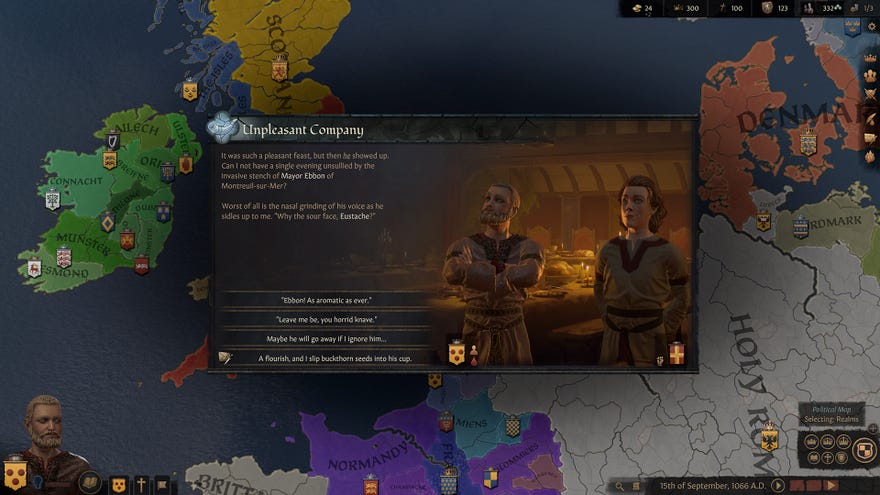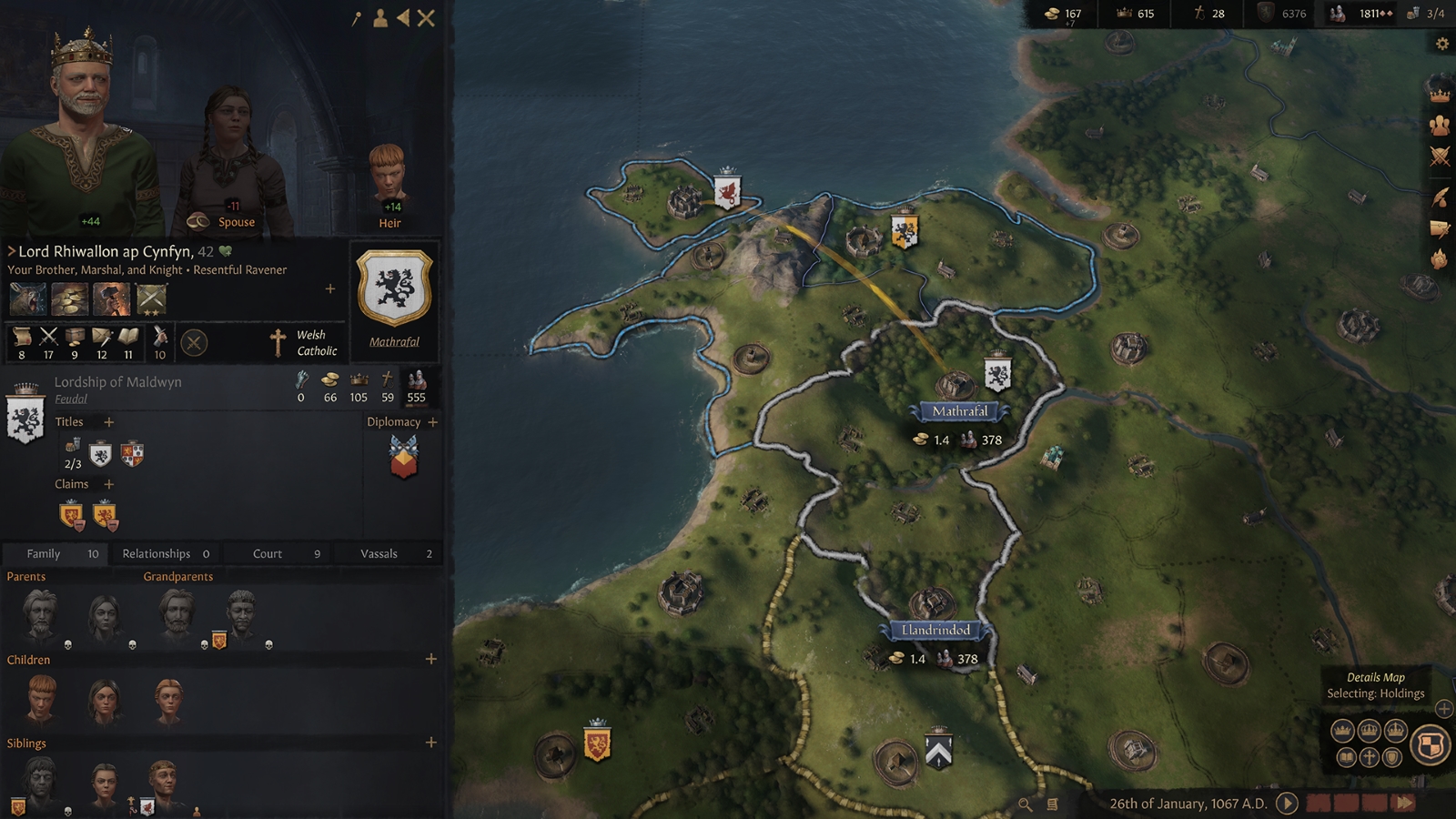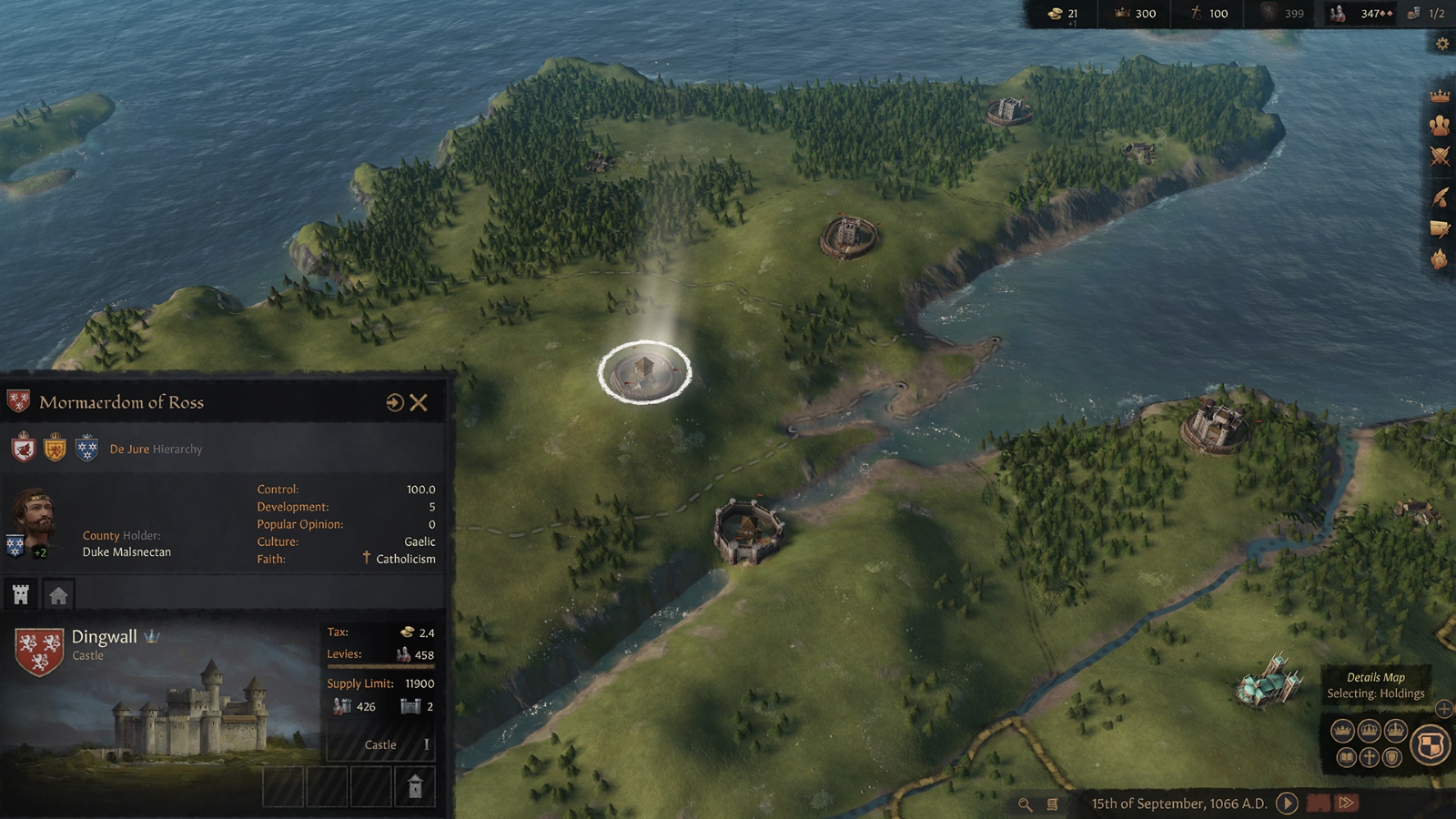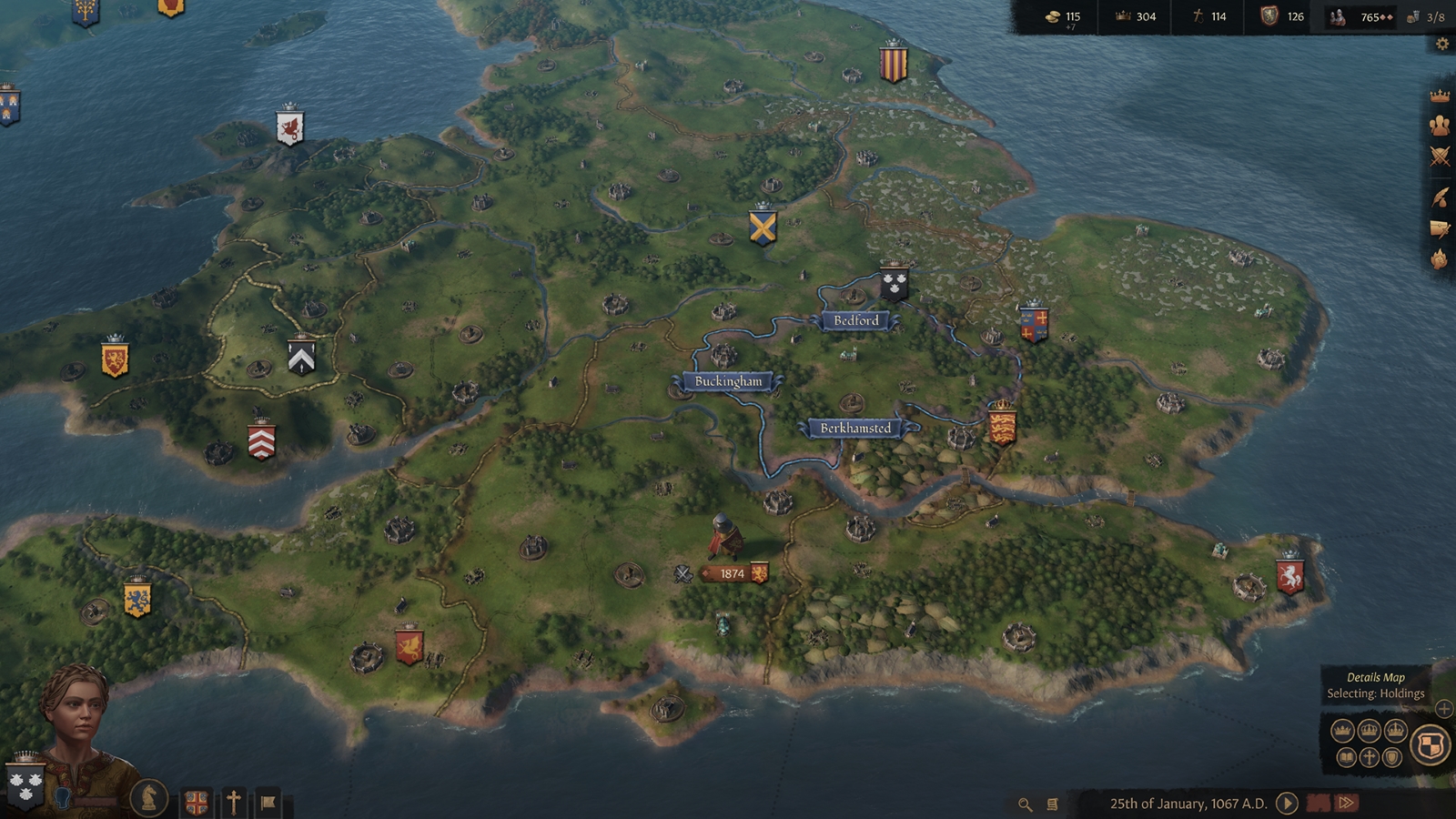In Crusader Kings 3, character is everything
When you're king, there are no bad ideas
Crusader Kings 2 isn’t the easiest game to define. It mixes Paradox’s grand strategy formula with a big bucket of RPG flavour, creating something that’s just as playable as an emergent storytelling toy as it is as a wargame. Crusader Kings 3, its freshly-announced sequel, has this same mix of ingredients. But from what we’ve seen so far, it looks like it might just have edged over the line from “a strategy game with RPG elements” to “an RPG you play on a map”.
Let’s be clear: it’s still very much a strategy game. Crusader Kings 3 is about exploiting a range of interlocking systems -- from military power to succession law to church doctrine -- to grab big metal gauntlets full of power, and rise to the top of the medieval world. That world is now bigger, too. Four times the size, in fact, which brings it to a par with the vast map of Imperator: Rome. And the mechanics used to manipulate it are as varied as they ever were. More than in CK2, however, all of them are affected by who your ruler is as a character.
This is one of the game’s fundamental design principles: as game director Henrik Fåhraeus puts it, “this is a game about characters, so characters should matter in every single feature”. This is clear right from the game’s menu screen, which renders three members of the dynasty you’re currently playing, standing around looking medievally shifty. Art is a long way from done on CK3, but the models already look clearly related, their hair and facial features showing off the sims-esque genetic modelling built into the game’s back end.
These portraits make it into the game too, replacing the 2D portraits of CK2 and their occasionally weird ageing. They’re animated without being gaudy, and one look at a character gives you the measure of them. “Bold Blackguard” reads the text next to the name of one bloke I’m shown. Every character has an adjective-noun descriptor string extrapolated from their personality values, but I could tell he was a blackguard just by looking at him -- he’s got a stooped, glowering demeanour, and massive Resting Bitch Face. He seems a right shit.
Much like the new “suggestions” feature, which allows you to scan over a list of things you might want to do at any given time (pursue title claims, start wars, attack children with reptiles), the portraits feel like a way of making the hidden more visible, without obstructing or patronising veteran players. They bring the characters of your family members and rivals - usually the same people - to the surface, perhaps making roleplaying more instinctive.
But how to form your own ruler’s character? As well as the traits which will presumably inflict themselves on you as a result of random events and your own decisions (I hope this makes a return from CK2, where throwing a feast could lead to you gaining an innate sense of justice), there’s a whole new skill tree system.
This has been grown out of the lifestyle focus mechanic from Way Of Life, one of CK2’s most popular expansions. Not all of the CK2 DLC features have returned for the sequel (like the nomad states introduced in Horse Lords, which never worked quite the way Paradox wanted them to, and so have been retired) but Way of Life was transformative. “I think it might be the [DLC] idea I was most happy with,” says Fåhraeus, “and it almost felt like it should have been there from the start.”
With CK3, it very much has been. At launch, the game has five lifestyles to choose from -- strategic, economic, scholarly, intrigue-y and religious -- within each of which are three skill trees bearing nine perks. That’s 135 perks in total, and as I understand it, you can work across any of the fifteen skill trees simultaneously, although it’ll be rare to get very far in more than one lifestyle. So if you want to be a warrior-poet or an assassin-saint, you can have it your way.
The traits you cultivate for your character won’t just inform their abilities, but the types of things that happen to them. Maximilian Olbers, the game’s content design lead, had been working on Stellaris prior to moving focus to CK3, and took a lot of that game’s thinking on event design over with him.
“A big one we learned from Stellaris is that it’s good when there’s a direct link between action and reaction in the case of events,” he explains. “The old style would have random events popping up and telling you something that might or might not be relevant, generated by basic game state parameters and a random timer. We’re successfully moving away from that now - virtually every event in Crusader Kings 3 is a direct consequence of either an action that you did, or an AI actor in your vicinity.”
For example, if a nearby ruler picks a diplomatic lifestyle for themself, and focuses on building their skill in foreign affairs, you can expect to see the results in your own realm. They might invite you on hunts, or lavish diplomatic summits… but they might also choose to throw their weight around more in the ducal political landscape. “It’s important to remember that almost all of the events are two-sided,” says Olber. “Either you’re doing something, or someone else is doing it to you.”
Olber’s content team seem to have really outdone themselves writing those events, by the way. When I ask what side-projects people have gotten carried away with, I find out there’s a player-facing chivalric courtship scheme in the game, as well as what Olbers calls “a (bad) poetry generator”, and even a procedural sex scene generator. One can only imagine the horrors that will produce.
In beefing up the game’s focus on character, there’s also been a rationalisation of the hordes of smaller, baron-level NPCs and courtiers that clogged the character lists in CK2. There aren’t necessarily less of them, but they’ve got more to do. “They made sense when playing on a small scale,” says Fåhraeus, “but on a larger scale, they sometimes became less interesting.”
As a duke or even a count with a single province under feudalism, you’ll have a whole new headache to manage in the form of the feudal contract -- a changeable agreement with each of your vassals governing their obligations to you as their lord. Still, there will be more tools to use for levering this to your advantage. My favourite is the “hooks” system, where owed favours, or the discovery of blackmailable transgressions, can be used to strongarm your vassals (or even your lords!) into more favourable contracts.
As well as arguing with you over feudal contracts, your barons and courtiers will be able to play a direct part in military affairs, joining armies not just as appointed commanders, but as knights. I’m not sure how this will look in action, but it seems an army can have dozens of knights embedded in it, who will contribute heavily to battles thanks to their superior equipment and training. Part of the rationale for this, Fåhraeus explains, is to lead to “Agincourt moments”, where you have a large number of your subsidiary characters out on campaign with you, and the potential to lose great swathes of your feudal hierarchy in the event of a disastrous battle.
One place where your court won’t congregate in hordes, however, is in schemes. In CK2, if you wanted to start a plot against someone’s life, you’d generally float the idea in private, and see dozens of pudding-bowl-haircutted nobodies queue up as if someone was handing out free beers. Game designer Alexander Oltner says this feels a bit less odd now.
“Scheming is so different in CK3. This time, it’s about quality rather than quantity. I mean, think about it -- if you had hundreds of people willing to plot against the king, that’s not a plot: it’s an open rebellion. It would be pandemonium. Now, you want a few powerful conspirators who are really close to the target, and unless the target is truly disliked, you’ll want characters with really high intrigue -- maybe their spymaster -- on side.”
This quality-over-quantity approach applies to the religious world, too. While your church holdings (now shown on the map, alongside castles and cities) will be run by bishops or their equivalents as in CK2, they will also be represented en masse by an Archbishop-type figure, with control over the purse strings. If you’re not endorsed by this guy, you’ll stand to lose the third of your levies coming from the church. “And if he really doesn’t like you,” Fåhraeus warns, “he’ll start messing in your affairs.” Will nobody rid me of this turbulent priest, indeed.
Not only does CK3 allow more opportunities to roleplay, but it gives you good reasons to do so, too. Fåhraeus explains: “In CK2, you can largely ignore your own personality traits. You’re the player character, right, so why does it matter? In this game, we wanted to make it matter.” The answer to this is the Stress system, which imposes difficulties if you play wildly against your character type. “It’s nothing major to begin with, but for each level of stress you gain, you risk a negative trait or another type of cost, and if you hit the roof, it’s bad news.”
This bad news is good news, as far as I’m concerned. Too often in CK2 I played it safe with my characters even if they were reckless, or acted too pleasantly in events even when playing a complete bastard. It’ll be interesting to have an incentive to go all in on a character.
Of course, all of this talk of roleplaying applies to individual rulers, but in Crusader Kings 3 there’s an entire RPG metagame, in the form of the dynasty system. Your initial ruler will almost always be a Dynast -- the head of a great house -- and as you go through their generations of descendants, you’ll be able to gradually build up the characteristics of their lineage until it’s the medieval family of your dreams and/or nightmares. In other words, there’s bloodlines, too.
I heard someone at the studio joke that having coined Grand Strategy as a genre, Paradox is now attempting to invent the grand RPG, and it feels like a fair description. Building up the characteristics of your dynasty will rely upon the generation of Renown, which you’ll earn through making your family known outside the borders of your realm. For example, the marrying-off of spare offspring into distant empires will now have a worthwhile purpose even when it leads to no chance of acquiring new titles, as it will increase Renown.
This can be invested on a screen split into horizontal tracks, each representing a series of linear, themed legacy perks. The Blood track, for example, has perks that will make your offspring less likely to succumb to disease, or that will make the inheritance of traits such as intelligence, or even gigantism, more likely. Renown can also be spent on performing dynastic actions, such as legitimising bastards, claiming titles, or -- if I understood correctly -- even splitting the house into cadet branches.
This system adds a real Game of Thrones feel to proceedings. While in CK2 the character of your nation was always transient, starting from scratch every time you took the reins with a new heir, here it will be shaped by every successive ruler. If you want a dynasty of grim, ascetic torturers like the Boltons, or big, brash Baretheons, you can make it happen.
This was in part a reaction to what Oltner calls “loss aversion” in CK2 - players quitting when they felt they had “lost”, either through their empire falling apart to Gavelkind division upon a ruler’s death, or being guzzled by rivals after a disastrous war. Looking to games like my beloved Dwarf Fortress, Oltner explains, CK3’s design team asked themselves “how can we make losing fun?”, and came up with the dynasty system. Now, no matter how much one ruler pisses their luck up the wall, there will always be a way to retain some of what you’ve worked for since the start of the game. It’s another way of encouraging players to really jump into the character of a ruler, rather than playing it safe to avoid disadvantage.
Finally, there’s another RPG metagame in CK3, in the form of customisable faiths. Religions in the game comprise small sets of core tenets, and a longer list of doctrines, which concern their views on issues such as lay preachers, or whether the bible should be translated into common languages. As I understand it, changing these doctrines amounts to creating a heresy, risky in itself, while changing core tents (for example, casually making ritual cannibalism a part of Catholicism) means splitting off an entire new religion.
This type of thing, understandably, tends to cause quite a fuss, enraging popes and giving your faith-sharing neighbours free Casus Belli. “If you have enough piety and you can handle the turmoil,” says Fåhraeus, “it’s something you can do, but it’s probably only something to consider when you’re some way into the game and you feel powerful.”
You could do that. Or, of course, you could do it as a reckless king surrounded by powerful rivals, who wakes up in a strange mood and decides it’s time for a change. It might go very poorly for you… but then that’s why you’ve got heirs, right? In Crusader Kings 3, it seems, there’s never a good reason not to do exactly what you feel like doing - and that’s what being a king is all about.













